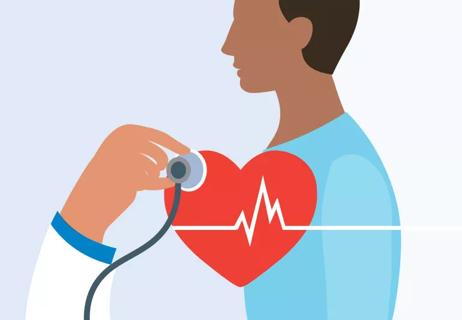Take steps to modify risk factors as you age

Read any article on cardiovascular disease prevention, and you’ll learn that the major risk factors are age, sex, race, smoking, high blood pressure, high blood lipid levels, diabetes, metabolic syndrome, obesity and a sedentary lifestyle.
Advertisement
Cleveland Clinic is a non-profit academic medical center. Advertising on our site helps support our mission. We do not endorse non-Cleveland Clinic products or services. Policy
But have you ever wondered if each risk factor influences risk to the same degree? The answer is no. All cardiovascular disease risk factors aren’t created equal.
“More than half — almost three quarters — of cardiovascular disease risk is determined by age, sex and race,” says preventive cardiologist Luke Laffin, MD. “The other risk factors add some prognostic value, but not as much as you’d think.”
Smoking, high blood pressure, high blood lipid levels, diabetes, metabolic syndrome, obesity and a sedentary lifestyle are known as modifiable risk factors. Their impact on the heart can be reduced by making certain lifestyle adjustments or taking specific medications.
Age, sex and race are known as non-modifiable risk factors. They can’t be changed. Of the three, aging has the biggest impact on cardiovascular disease risk. Your risk of suffering a cardiac event increases as you age.
“That’s the reason the risk calculators we use show older patients are at elevated risk of cardiovascular disease, even if all other risk factors are under control,” Dr. Laffin explains. “Risk factors like high blood pressure and high cholesterol tend to enhance risk, but they don’t play as big a role as aging itself.”
The impact of four key modifiable risk factors on cardiovascular disease was the subject of a recent study in Circulation.
Researchers evaluated the contributions of high blood lipid levels, high systolic blood pressure (SBP), diabetes and smoking on the development of coronary artery disease events overall and by age on more than 22,600 cardiovascular disease-free adults ages 45 to 84 participating in four National Heart, Lung, and Blood Institute-sponsored studies.
Advertisement
The findings were somewhat surprising: “The study showed some risk factors are more important than others,” says Dr. Laffin.
Individually, each risk factor had less of an impact on the ability to predict a heart attack or other cardiovascular event as the participants grew older. However, high SBP and high cholesterol were so prevalent that their contribution could not be overlooked. The researchers determined that if every participant had lowered their SBP to normal and their LDL cholesterol by 30%, the number of heart attacks would have dropped substantially.
If you have multiple cardiovascular disease risk factors when you are younger, they are more powerful at predicting you’ll have a cardiovascular event than if you develop them when you are older.
“Having high SBP will increase your risk as you age, but not to the same degree as SBP in someone much younger,” says Dr. Laffin. This does not downplay the importance of major risk factors at any age.
“All risk factors for cardiovascular disease are important. If you have any of them, they are definitely going to increase your risk,” he says. Because you can’t roll back your age, you would be wise to do everything you can to lower your cardiovascular disease risk as you grow older. This means:
“Cardiovascular disease risk is going to increase no matter what you do, so you have to control the modifiable risk factors as much as possible,” says Dr. Laffin.
This article originally appeared in Cleveland Clinic Heart Advisor.
Advertisement
Learn more about our editorial process.
Advertisement

If you don’t have other symptoms, try using relaxation techniques and vagal maneuvers to calm your heart down

Chronic stress can trigger palpitations, inflammation, angina and other serious heart issues

Yes — and depending on the level of dehydration, you may need emergency care

Research shows a strong association between rheumatoid arthritis and heart issues

Knowing what you can do to prevent or manage heart disease is half the battle

A skipped heartbeat is usually your heart returning to its normal electrical path

Don’t self-medicate with vitamin supplements without consulting a doctor first

Too little magnesium can make your heartbeat go off beat

Start having sex about 72 hours before ovulation, then at least every other day during your fertile window

Attachment theory suggests that your earliest relationships shape connections throughout your life

It isn’t a recognized mental health disorder, but research shows that problematic social media use can negatively affect your mental health, self-esteem and sleep